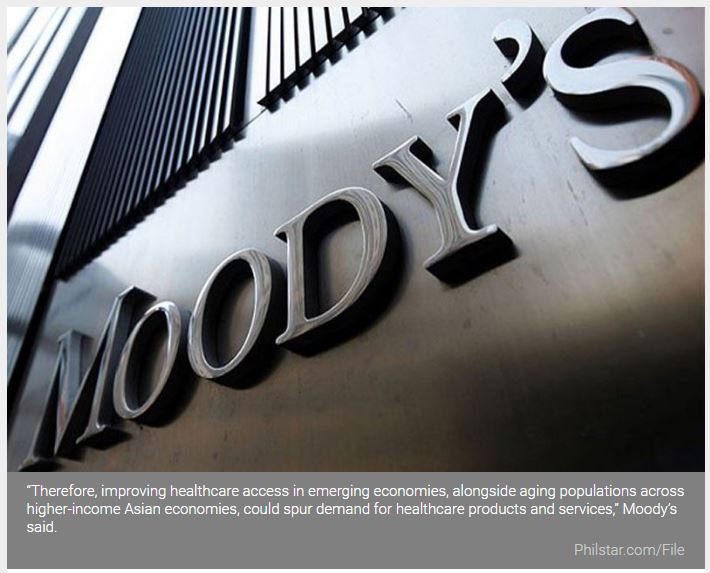Moody’s raises concerns on health, safety issues in Philippines
MANILA, Philippines — Moody’s Investors Service has raised a red flag over health and safety in the Philippine as COVID-19 cases in the country topped the 500,000 mark.
In a report, the debt watcher said health and safety has been identified as a source of “highly negative risk” for the Philippines and India.
“Therefore, improving healthcare access in emerging economies, alongside aging populations across higher-income Asian economies, could spur demand for healthcare products and services,” Moody’s said.
Moody’s said governments facing budgetary pressures may seek to constrain healthcare spending.
“Governments’ fiscal burdens could increase alongside more demands for effective public health systems and social safety nets,” it said.
The international credit rating agency said the growing demand for healthcare services and infrastructure spending may increase fiscal challenges.
“A traditional emphasis on infrastructure spending to support growth may now have to expand to include social spending on healthcare and pensions. The pandemic has highlighted existing gaps in health infrastructure in some parts of Asia,” Moody’s said.
Moody’s said increased pressure on infrastructure spending may also lead to higher burdens on utilities and other infrastructure providers in the region as state-owned infrastructure companies tend to play a key role in stimulus measures to aid economic recovery.
However, the debt watcher expects activity in the transport infrastructure sector to pick up this year, reflecting some improvement in global traffic and trade flows amid a gradual economic recovery.
It warned long-standing risks would continue to weigh on the region, as there remains considerable uncertainty surrounding the potential path of the COVID-19 pandemic, the public health response, and associated activity disruptions, most notably for contact-intensive sectors.
“The region as a whole has kept the pandemic relatively under control. Governments in Asia are progressively rolling out vaccine programs to frontline workers and the most vulnerable. In terms of rollout plans, there is also a degree of heterogeneity across the region,” Moody’s said.
According to Moody’s, the true extent of the damage to potential growth and the overall setback to the region as a whole would depend on the persistence of the pandemic shock and the effectiveness of the policy response.
“We expect dollar-funding costs to be less of a constraint in Asia as a whole in 2021 than in 2020 as a result of the accommodative US monetary stance and ample global liquidity,” it said.
It added international investors are expected to increasingly differentiate between countries based on relative growth outcomes and external vulnerabilities as the recovery progresses.
“As a result, some central banks in Asia may actively intervene in foreign-currency markets to manage their currencies as a result of capital inflows. Sudden shifts in sentiment could also affect market access for companies with weaker liquidity and increase corporate debt service challenges for the region.
This, Moody’s said, may fuel second-round effects for the region’s banks in terms of debt repayment capabilities and rising default risks.
Source: https://www.philstar.com/business/2021/01/27/2073242/moodys-raises-concerns-health-safety-issues-philippines


 Thailand
Thailand




